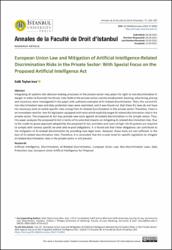| dc.contributor.author | İnce, Salih Tayfun | |
| dc.date.accessioned | 2023-03-24T12:24:23Z | |
| dc.date.available | 2023-03-24T12:24:23Z | |
| dc.date.issued | 2022 | en_US |
| dc.identifier.citation | İNCE, Salih Tayfun. "European Union Law and Mitigation of Artificial Intelligence-Related Discrimination Risks in the Private Sector: With Special Focus on the Proposed Artificial Intelligence Act". Annales de la Faculté de Droit d’Istanbul, 71 (2022): 265-307. | en_US |
| dc.identifier.uri | https://dergipark.org.tr/tr/pub/iuafdi/issue/75810/1249367 | |
| dc.identifier.uri | https://hdl.handle.net/11352/4415 | |
| dc.description.abstract | Integrating AI systems into decision-making processes in the private sector may place the right to non-discrimination in
danger. In order to illustrate this threat, risky fields in the private sector, namely employment, banking, advertising, pricing
and insurance, were investigated in this paper with authentic examples of AI-related discrimination. Then, the current EU
non-discrimination laws and data protection laws were examined, and it was found out that these EU laws do not have
the necessary tools to tackle specific risks arising from AI-related discrimination in the private sector. Therefore, there is
an immediate need for new EU legislation equipped with tools which explicitly target AI-related discrimination risks in the
private sector. The proposed AI Act may provide new tools against AI-related discrimination in the private sector. Thus,
this paper analyzes the proposed AI Act in terms of its potential impacts on mitigating AI-related discrimination risks. Due
to the cradle-to-grave approach adopted by the proposed AI Act, providers and users of high-risk AI systems are required
to comply with various specific ex-ante and ex-post obligations. It is found out that these obligations can contribute to
the mitigation of AI-related discrimination by providing new legal tools. However, these tools are not sufficient in the
face of AI-related discrimination risks. Therefore, it is concluded that the crucial need for specific legislation to mitigate
AI-related discrimination risks in the private sector is still present. | en_US |
| dc.language.iso | eng | en_US |
| dc.publisher | İstanbul University Press | en_US |
| dc.relation.isversionof | 10.26650/annales.2022.71.0002 | en_US |
| dc.rights | info:eu-repo/semantics/openAccess | en_US |
| dc.subject | Artificial Intelligence | en_US |
| dc.subject | Discrimination | en_US |
| dc.subject | AI-Related Discrimination | en_US |
| dc.subject | European Union Law | en_US |
| dc.subject | Non-Discrimination Laws | en_US |
| dc.subject | Data Protection Law | en_US |
| dc.subject | European Union Artificial Intelligence Act Proposal | en_US |
| dc.title | European Union Law and Mitigation of Artificial Intelligence-Related Discrimination Risks in the Private Sector: With Special Focus on the Proposed Artificial Intelligence Act | en_US |
| dc.type | article | en_US |
| dc.relation.journal | Annales de la Faculté de Droit d’Istanbul | en_US |
| dc.contributor.department | FSM Vakıf Üniversitesi, Hukuk Fakültesi | en_US |
| dc.contributor.authorID | https://orcid.org/0000-0002-0750-8152 | en_US |
| dc.identifier.volume | 71 | en_US |
| dc.identifier.startpage | 265 | en_US |
| dc.identifier.endpage | 307 | en_US |
| dc.relation.publicationcategory | Makale - Uluslararası Hakemli Dergi - Kurum Öğretim Elemanı | en_US |
| dc.contributor.institutionauthor | İnce, Salih Tayfun | |



















